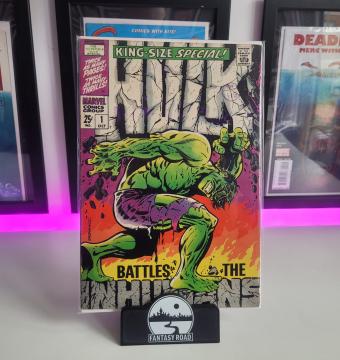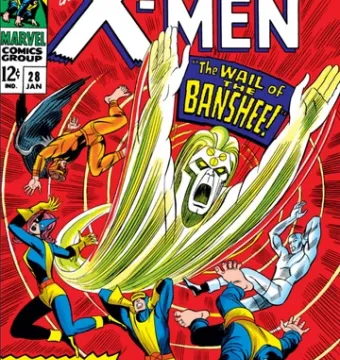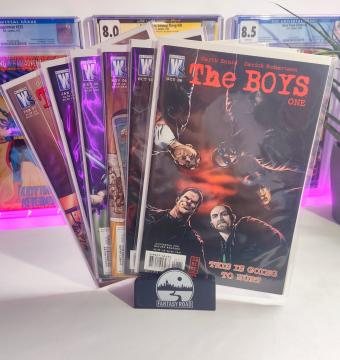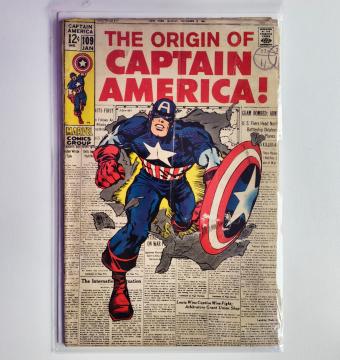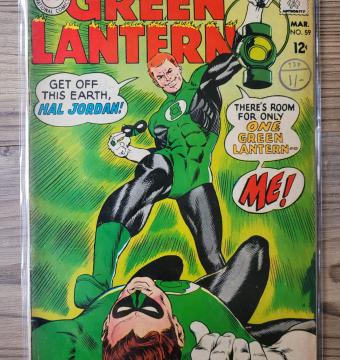Comic book collectors have long debated the value of CGC (Certified Guaranty Company) grading. Whether you’re a seasoned collector or someone sitting on a long-forgotten box of comics in the attic, understanding the role of grading is crucial. Grading can significantly affect the value of your comics, but it’s not always the right choice for every book. Let’s dive into the world of CGC grading, exploring when it makes sense to grade, when it doesn’t, and some handy tips for deciding what to send for grading.
What Is CGC Grading?
The Certified Guaranty Company (CGC) is a professional grading service specializing in assessing the condition and authenticity of comic books. Once graded, the comic is encased in a tamper-proof slab with a grade from 0.5 to 10.0, along with details about its authenticity and any restoration. A higher grade usually means a higher value, making CGC grading a game-changer for collectors and sellers alike.
The Impact of CGC Grading on Comic Book Values
Grading can significantly boost the resale value of a comic. A raw copy of a rare book may fetch hundreds of pounds, but a CGC-graded version of the same comic can command thousands, depending on its grade. Here are some factors that influence this impact:
1. Grade Premium
Higher-grade comics—those graded 9.0 and above—tend to see the most dramatic increases in value. For example, a raw Amazing Fantasy #15 (Spider-Man’s first appearance) might be worth tens of thousands, but a CGC 9.6 copy sold for a record-breaking $3.6 million in 2021.
2. Buyer Confidence
A CGC grade provides assurance to buyers. It removes uncertainty about the condition, making it easier to justify paying a premium.
3. Marketability
Graded comics are more attractive to investors and high-end collectors. The encapsulated condition guarantees long-term preservation and makes the comic a more appealing investment.
When to Grade a Comic Book
Not every comic is worth grading. Here are some situations where grading makes sense:
1. Key Issues
Key issues—those featuring first appearances, significant events, or iconic covers—are prime candidates for grading. Examples include:
-
Amazing Fantasy #15: First appearance of Spider-Man.
-
Detective Comics #27: First appearance of Batman.
-
Hulk #181: First full appearance of Wolverine.
2. High-Value Books
Comics already valued at several hundred pounds or more are good candidates. Grading can validate their worth and often increase it significantly.
3. High-Grade Modern Comics
Modern comics can benefit from grading, especially if they are rare variants or exclusives. A 9.8-grade modern comic can fetch a premium compared to its raw counterpart.
4. Preservation
Grading and encapsulation protect your comic from further damage, ensuring its long-term value.
When Not to Grade a Comic Book
While CGC grading has its benefits, it’s not always the best choice. Here are some scenarios where you might skip grading:
1. Low-Value Comics
If a comic is worth less than £50, the cost of grading (often around £25-£60 per book) might outweigh the potential increase in value.
2. Poor Condition
Low-grade comics (below 3.0) often don’t see a significant value boost unless they are exceptionally rare or iconic.
3. Bulk Runs
Common issues from large print runs, unless they’re pristine or key issues, are usually not worth grading.
Tips and Tricks for Deciding What to Grade
If you’re on the fence about which comics to grade, here are some helpful tips:
1. Do Your Research
Use resources like GoCollect and ComicLink to check recent sales data for graded versions of your comic, though bare in mind - these are US based price-crawlers, and as such, do not reflect the UK market adequately. Use these tools to get a general idea of pricing, though your best bet is always eBay sold listings.
2. Inspect the Condition
Look for:
-
Sharp corners
-
White or off-white pages
-
Minimal spine creases
-
Vibrant colors
Some defects, such as fingerprints, and certain restoration, is not always visible to the naked eye, so be warned!
3. Check for Restoration
Restored comics often see diminished value. Ensure your comic hasn’t been altered unless it’s disclosed as part of the grading process.
4. Weigh the Costs
Factor in grading fees, shipping, and potential sales commission to decide if grading is financially viable.
5. Consult Experts
If in doubt, consult with a professional. Here at Fantasy Road, we offer a free pre-screening service, to help determine whether a book is worth grading. You send us your book with the directive of checking it over first, if we don't think it's worth working on and sending off, we return to you at cost. Simples.
Resources for Learning More About CGC Grading
For those looking to dive deeper into grading, these resources are invaluable:
Or if you're ready to take the leap - Click here to visit our submissions and services page!
Ready to Sell Your Graded or Raw Comics?
At Fantasy Road, we specialize in buying comic book collections, whether raw or graded. If you’re sitting on a treasure trove of comics and wondering how to sell, look no further. Here’s why you should sell to us:
-
Hassle-Free Transactions: We handle everything, from evaluation to payment.
-
Top Market Prices: Our expertise ensures you get the best possible value.
-
Quick Turnaround: Don’t wait weeks for a buyer—we’ll make you an offer fast.
Whether it’s a complete Silver Age Avengers run, a collection of CGC 9.8 modern variants, or a stash of first appearances, we’re ready to help. Visit our Sell Comics page to get started.
Grading can be a game-changer, but it’s all about knowing when and what to grade. With the right knowledge, you can maximize the value of your collection. And when you’re ready to part with those gems, Fantasy Road is here to make it easy and rewarding.




